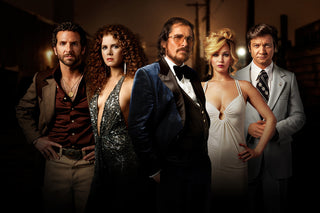
“Did you ever have to find a way to survive and you knew your choices were bad, but you had to survive?” That’s the crux of the thematic premise of David O. Russell’s latest film, American Hustle. I feel like I’m drawn to movies where the protagonist isn’t some shining beacon of hope with a northerly moral compass that only dictates he rights the wrongs of all those living in a much more real world. With Hustle, we’re forced to latch on to Irving Rosenfeld (as played by Christian Bale) – a con artist/ice to an Eskimo guy who spins one-liners like, “She was the Picasso of passive-aggressive karate.” Nabbed by a anxious and eager F.B.I. agent (as played by Bradley Cooper), the story really gets moving when Rosenfeld and his accomplice are forced to cooperate with the Feds.
There’s a definite Martin Scorsese vibe to the way the film plays out. Both the aforementioned “master of sinister undertakings with empathetic sociopaths” and David O. Russell know that humor can be just as an effective tool as violence in creating a colorful and all-too-real world. As Charlie Chaplain once said, “Life is a tragedy when seen in close-up, but a comedy in long-shot.” Influenced by the 1978 ABSCAM sting operation that convicted seven U.S. congressmen, the fact that many of the events of the film were actually inspired by real events always lingers in the back of your mind as the ensemble cast get deeper and more heavily involved with murderers.
Much like his previous film, Silver Linings Playbook, Russell chooses to focus on characters over a tightly-constructed plot. That is to say, we’re in capable hands as we ultimately build to a climax, but the journey is more fun than the resolution. Why? Because if it’s based in truth, things never end well.
Why you should see it: Aside from Quentin Tarantino and Rian Johnson, David O. Russell is one of the best writer/director’s in Hollywood.
The relationship between Christian Bale and Jeremy Renner really tugs at the heartstrings.
Grade: B+

